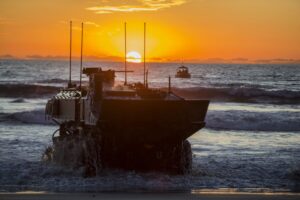BAE Systems has received a new $184 million order from the Marine Corps for 36 more Amphibious Combat Vehicles (ACV), the Pentagon announced Wednesday evening.
This is the Marine Corps’ second full-rate production order for ACV, with deliveries under the latest deal expected to begin in 2022.

“The exercising of this option validates years of teamwork in partnership with the Marines to provide the most adaptable amphibious vehicle possible to meet their expeditionary needs,” John Swift, BAE Systems’ director of Amphibious Programs, said in a statement.
The Marine Corps approved the ACV for full-rate production in December with a $184.4 million deal also covering 36 vehicles, with both orders for the platform’s personnel variant (Defense Daily, Dec. 10).
BAE Systems said, to date, the company has delivered 50 ACVs to the Marine Corps.
The Marine Corps will go with a family of vehicles approach for ACV built around three additional variants: a turreted version (ACV-30), a command and control platform (ACV-C), and a recovery variant (ACV-R).
A recent report from the Pentagon’s operational testing and evaluation office (DOT&E) said the ACV performed better than the legacy Amphibious Assault Vehicles vehicle across all mission profiles during Initial Operational Test & Evaluation in the summer of 2020, while the force continues to work on incremental improvements to the platform during Reliability Growth Testing.
“The vehicle was assessed as operationally effective, operationally suitable and survivable by DOT&E; however, the program office continues to work with the Fleet, industry partners, and other stakeholders to ensure we continuously improve the ACV’s operational capability including potential material and training improvements with the weapons station, suspension, sensors and switches,” Barb Hamby, a spokesperson for the Marine Corps’ Program Executive Officer Land Systems, told Defense Daily.
The DOT&E report notes the Marines equipped with the ACV were “successful in 12 of 13 missions,” with Hamby noting progress has been made to address land mobility and minor tire failure issues in the desert environment identified in the report.
“It is important to note that this issue is applicable to the desert environment only, and was not experienced at any of the other test locations. This issue will be partially mitigated as Marines become more familiar operating a wheeled system instead of the tracked system,” Hamby said.